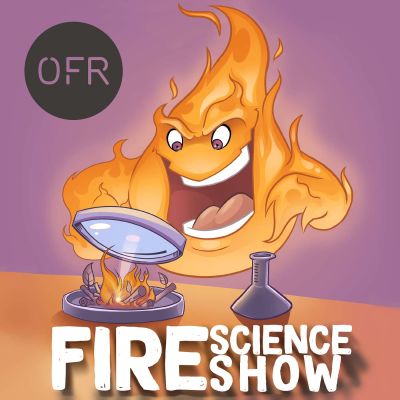Fire Science Show is connecting fire researchers and practitioners with a society of fire engineers, firefighters, architects, designers and all others, who are genuinely interested in creating a fire-safe future. Through interviews with a diverse group of experts, we present the history of our field as well as the most novel advancements. We hope the Fire Science Show becomes your weekly source of fire science knowledge and entertainment. Produced in partnership with the Diamond Sponsor of the show - OFR Consultants
https://www.firescienceshow.com/
Gesamtlänge aller Episoden: 5 days 20 hours 15 minutes
episode 1: Introduction
Let's do this. For the first time... Welcome to the Fire Science Show!
My name is Wojciech Wegrzynski, and I'm with the Building Research Institute (ITB) in Warsaw, Poland.
In this episode you will learn who I am, where do I come from and why I have decided to start a fire science podcast. I'm sharing my journey from a frontline CFD engineer to a professor at the ITB...
episode 2: Smouldering megafires with Guillermo Rein
Guillermo Rein is a recipient of ERC Consildator Grant on smouldering megafires. The most challenging source of founding, meant for the projects that can truly change the world. And his HAZE project is just like that - to study a phenomenon that accounts for more than 13% of anthropogenic CO2 emissions and takes the lives of thousands (millions?) of people every year...
episode 3: Tenability criteria with Gabriele Vigne
How do you know if a building is safe in fire or not? Usually through performing ASET-RSET analyses, in which you determine how and when the tenability criteria in the building are breached. This is what I discuss with dr Gabriele Vigne. We discuss the overall use of tenability criteria in fire science, and in more details, the use of visibility in smoke.
--- LinkedIn Discussion thread ---
https://www.linkedin...
episode 4: Facade fires and AI with Matt Bonner
Dr Matthew Bonner of the Imperial College London is one of the leading scientists touching on the subject of the fire safety of facades. His flavour is tackling the complexity through big data analyses and developing new ways to use AI to help us in future. His research has started few months before the Grenfell, and the tragedy has definitely made more eyes follow his studies...
episode 5: Battery fires with Roeland Bisschop
Today I've talked to Roeland Bisschop, Project Manager in RISE, about his first-hand experience with battery fires. Roeland explained to me how do battery fires look from a scientific perspective, and how my perspective was kind of skewed by viral online videos. I've learnt a lot about fire propagation and products, as well as how to deal with fires that occured...
episode 6: 006 - EV's, rapid fires and car parks
In Episode 6, our host, dr Wojciech Wegrzynski, explains his experiences with modelling rapidly growing fires in car parks. Such fire growth may be typical for EV fires that originate in battery and pose a different set of challenges compared to "traditional" design fires used for car parks. The height of the car park is discussed as the variable that has the largest impact on the overall safety of the facility...
episode 7: 007 - AI in smart firefighting and the future of FSE PBD with Xinyan Huang
Everyone is talking about AI, but how can we really use it in fire safety engineering and firefighting? Prof Xinyan Huang of HK PolyU will explain his research in this field, and we can consider it as a time travel to the future. We touch on the ideas of AI and machine learning, and what does it really do (and what it does not do)...
episode 8: 008 - Zone modelling is not dead with Colleen Wade
Zone modelling is a technique introduced in 1970's and 80's that has changed fire science. In my personal opinion, along with oxygen calorimetry and the development of FDS it may have been the most impactful tool of fire science. This is why I think its shameful it does not receive the same recognition today.
With Colleen we go deep into the zone models, discussing the tool itself and the ways to adapt it to current needs...
episode 9: 009 - Cognitive biases and decision making in evacuation with Michael Kinsey
Why do we take certain decisions during an evacuation process? How do we choose the evacuation route? These are often affected by cognitive biases, which is the main theme of today's episode. With Dr Michael Kinsey we will discuss how biases can be used to understand known behaviours and model human behaviour in a more realistic way. A lot of focus is placed on the evacuation modelling, and how the decision-making processes are implemented in the computer models.....
episode 10: 010 - Seeking the origins of standardized fire testing and ancient fire protection materials with John Gales
Did you know that the standard temperature-time curve, which is the underpinning of the fire resistance of assemblies, is over 100 years old? Once you know that, you cannot stop but think about how this affects modern construction works. In this episode, I'm interviewing dr John Gales from York University, who has spent over a decade studying the historical origins of fire testing and the standard curve...
